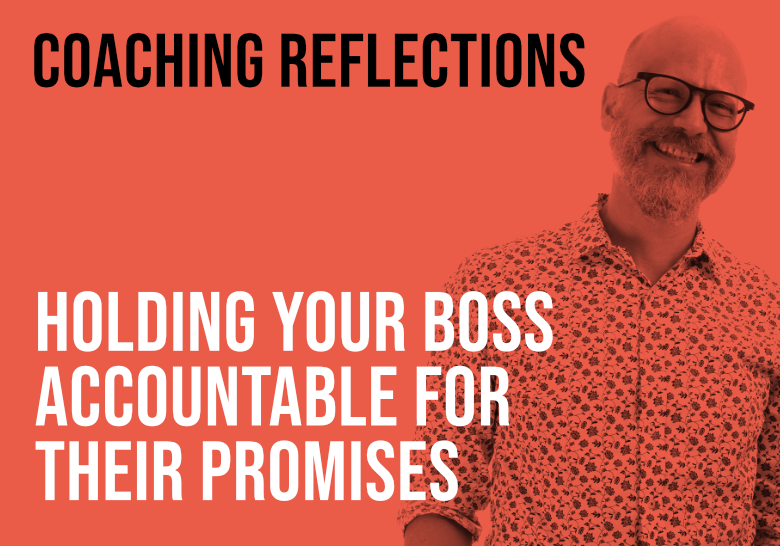Many of my coachees are presented with promises from their bosses in the guise of “this is a great opportunity for you” that never materialise. How might you set up some criteria for these so that you’re not sitting there a year later still hoping it is going to happen?
In this week’s Coaching Reflection I want talk about holding yourself and others accountable for those promises.
Transcript
Intro
Many of my coachees are presented with promises from their bosses in the guise of "this is a great opportunity for you" that never materialize. How might you set up some criteria for these so you’re not sitting there a year later, still hoping it’s going to happen?
My name is Andy Polaine. And every week I spend my days coaching design leaders. And in these videos, I reflect upon the common themes and questions that came up in the week. And this week, I want to talk about holding yourself and others accountable for those promises.
OKR-ish format
The way to think about this there’s some kind of loose version of OKRs. They’re not really OKRs. But the idea is you don’t fall for the old line of, yeah. Sorry. It didn’t happen this year, but next year, it’ll definitely happen we promise. This happens with projects. This happens with promotions, titles, salary increases and all of those things.
This is something you can also use when you’re interviewing for a job when you are being told, there’s all sorts of potential for growth in this role. Just be a little bit skeptical and think, okay. Fine, but what does that look like?
Start at the end
So my favorite thing is always to start at the end. If it had happened, what does it look like? What does good look like? Imagine you, you’re now running that team or you’ve got that title or we’ve got that new position or whatever it is. What does it look like?
Now it’s not going to happen all at once. So what would be the signs that you, what you want is happening? It’s in progress in some way.
This is so you don’t get stuck in some kind of almost there purgatory. What would be your timeline in three months? What would you see in six months? Or at the end of the year and you’re reflecting back, what would you expect to have happened?
Example
Let’s take the example of growing a team. If you think, well, by three months I would hope to have this person in place. And by six months I’d hope to have these other two people in place. And by the end of the year, when I looked back and I’ve got this team of X number of people, of this kind of constellation. If none of that is happening or there’s no job ads out there and budget approval, well, then you know that it’s not really happening. It’s just empty promises.
The Clark Rule
There’s a book by Dan Ward called Fire F.I.R.E. It stands for fast, inexpensive, restrained and elegant. And he talks about this thing called the Clark Rule that NASA adopted. And it’s named after a satellite project called Clark. And it’s this: Cancel any project when its cost growth exceeds 15%.
Now the book is all about projects that go over time and over budget often ask for more time and more budget. And in general, that leads to them just becoming so bloated that they fail anyway. They just fail after more resources have been spent on them. So having this rule up front to say, okay, when the cost growth exceeds 15%, we can the project, no questions asked. It’s still harsh when the project is canned, but but it’s not a surprise to anyone because there’s always going to have been some lead up to that. And this is what I’m saying about your projects.
Having those metrics and conditions, very tangible and upfront helps, you know, when you reach them or when you haven’t. And then you can be ready to walk away because that is the agency you always have in a job or in a position or a project or a title. You can always say, I’m not doing this anymore.
So you can use this for interviewing for a new role. You can use this for any new position or responsibilities you might be given in your current role. You can use it when you’re thinking about, oh, a lot of other things in life, actually.
Outro
I hope that’s useful for you. If you’d like to check out my coaching practice, it’s at polaine.com/coaching and you’ll also find more of these videos on YouTube. I’ll put the links below.
If you’ve got any of your own examples of how you’ve gone about things like this, please post a comment below. I’d love to hear them. I’d like to collect examples.
Thanks very much. And I’ll see you again soon.


